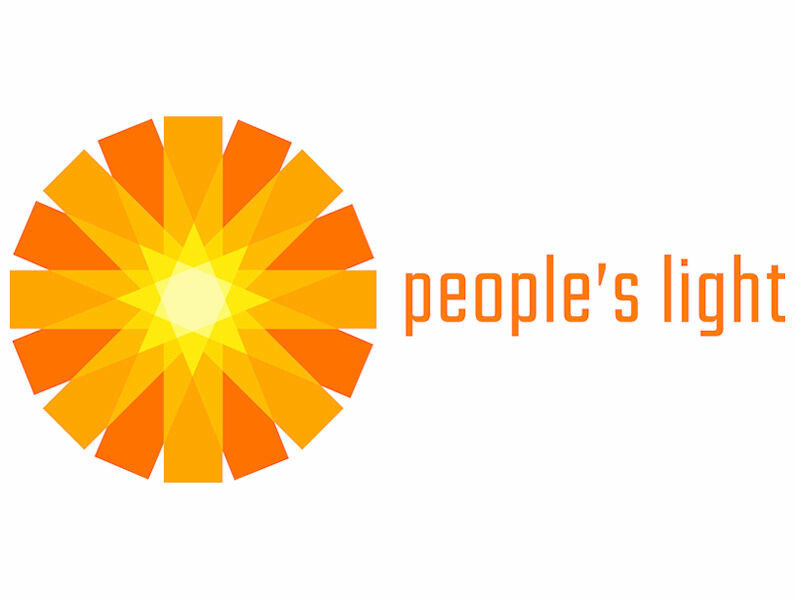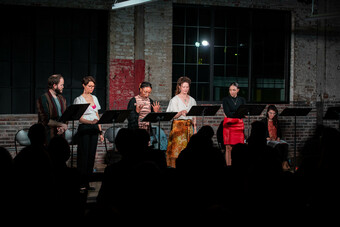Being Regional for a Reason
The Revolution Will Not Be Subsidized
This is the second in a series of blogs that chronicle the birth and infancy of New Play Frontiers. I will share the origins of this program, its impact on our organization, the process of selecting playwrights and community partners, as well as the discoveries we make during the residencies. Beyond reporting out, I hope this series will spark further conversation about the different motives for theaters offering playwright “residencies.” Who are we most trying to serve? What responsibility, if any, should “playwrights-in-residence” have to the individuals, organizations, and communities funding and supporting their work? And how can visiting playwrights participate in an institution’s effort to celebrate its regional identity? Find the full series here.
Part Two: The Revolution Will Not Be Subsidized
New Play Frontiers (NPF) is a story about demand. Our culture has made every effort to destroy the spirit and will of playwrights—to make us foreign and invisible—and yet writers who astonish, challenge, tickle, and incite continue to endure and remain loyal to the stage. There is no shortage of supply.
As we designed this new program at People’s Light, we brought Todd London to our campus to consult about regional dynamics, playwrights, and residencies. We visited Oregon Shakespeare Festival to gain insight from Bill Rauch and his colleagues about their civic engagement initiatives and American Revolutions Project. We collaborated for two weeks with Simon Sharkey and colleagues from the National Theatre of Scotland to learn their methodologies to devise new work in community. We met with John Eisner and Lisa Rothe at The Lark Play Development Center, Liz Frankel at The Public Theater’s Emerging Writers Group, Ron Russell at Epic Theatre Ensemble, Paul Meshejian at PlayPenn, and spoke with Jeremy Cohen at The Playwrights’ Center. These leaders in the field were invaluable sounding boards and idea generators. They recommended hundreds of playwrights for us to consider. There is no shortage of supply.
Anyone who knows my father, Len Berkman, may first mention his ponytail, 1970s short shorts, and Converse high-tops, but in the same breath will add that he is a human Google (actually he leaves Google in the dust) about playwrights ages 18-100, from Iowa to Israel, Northampton to Norway. With every one of my father’s “Have you thought of..?” is a story filled with joy about the writer’s spirit, imagination, and skill. There is no shortage of supply.
Supply may be compromised, battered, and bitter; supply may have terrible woes balancing family and work; supply may be riddled with student loans. But there is no shortage of supply.
At People’s Light there is also no shortage of passion with regard to new work. People’s Light has an extensive history of producing new plays. Of our three hundred eighty-four past productions, over one-third have been world or regional premieres. These include World Premieres by Russell Davis, Bruce Graham, Willy Holtzman, Quiara Alegria Hudes, Kenneth Lin, Louis Lippa, James Still, Karen Sunde, and numerous others. This season features four World Premieres by Bess Wohl, Y York, Wendy Bable, and the creative team of Pete Pryor, Samantha Bellomo, and Michael Ogborn. Furthermore, our subscribers continually demonstrate an appreciation for the new plays we produce. We know this anecdotally and by the higher intrinsic impact metrics these productions receive in our surveys (both from in-house surveys and those connected to our participation in the WolfBrown study highlighted in Counting New Beans).
Demand is the challenge. Despite a clear appetite for new work that exists for some audience segments in our region, the level of demand for new plays continues to be on the decline. We conclude this from our extensive communication with subscribers and single ticket buyers and measure it by advanced ticket purchases for new work compared to well-known contemporary and classic plays. There is an ongoing erosion of press covering new work and an impression throughout the artistic community here that the press is tougher on new plays. Further, there is the complex question of how the homogeneous composition of those who do support and attend new work at our theater (and I imagine other theaters of our size and age) might compel us to select plays that won’t appeal to younger or more ethnically and economically diverse constituencies.
In certain instances we can address these financial and cultural challenges through project-specific grants, but government and foundation funding cannot be relied upon to generate longstanding demand for diverse new work. New Play Frontiers would not exist were it not for substantial funding from The Pew Center’s Philadelphia Cultural Management Initiative, which allowed us to establish the cross-departmental infrastructure, execute the data collection, and cultivate the community partnerships to support the first round of NPF residencies. Nevertheless, NPF’s sustainability ultimately relies on the long-term investment of individual audiences and donors. We do not make plays for program officers no matter how brilliant and empathetic they may be. We make plays for our neighbors, for our soul mates, for our fellow passengers on this sometimes nauseating, sometimes exhilarating roller coaster of an American life. New work is not a charity. It is not something to subsidize or segregate. It is something that must exist because it is yearned for—necessary to the people who create it, nurture it, and experience it first-hand.
We make plays for our neighbors, for our soul mates, for our fellow passengers on this sometimes nauseating, sometimes exhilarating roller coaster of an American life. New work is not a charity. It is not something to subsidize or segregate. It is something that must exist because it is yearned for
The seismic shift NPF represents at People’s Light, therefore, is not a newly discovered recognition of the value of original work for the stage. Rather, NPF is a vital re-think about the strategic placement of new work in our organization’s structure, activities, and profile. The conception, development, and production of new work will now be an engine that drives our effort to identify, cultivate, and establish diverse new pipelines of support for and participation in our company. It will be an engine for demand that will ultimately transform what we put on our stages, the composition of our audiences and donors, and the way our neighbors perceive our service to the region.
The premise of NPF is our belief that to cultivate new long-term investors we must tell stories of deep and pre-existing meaning to these individuals—stories that connect them to their families and their neighbors. Not once. Not twice. Year after year. It is also our belief that the right kind of talented writers can elevate these stories into vibrant explorations of our American identity while in direct dialogue with these invested audiences.
In my next post I will write about the six playwrights selected to participate in the first round of NPF residencies, how and why they were “the right kind of talented writers,” and the status of their projects to date.













Comments
The article is just the start of the conversation—we want to know what you think about this subject, too! HowlRound is a space for knowledge-sharing, and we welcome spirited, thoughtful, and on-topic dialogue. Find our full comments policy here
Best of luck with the program Zak, I've no doubt it will be very rewarding. We've been hosting between four and six playwrights a year, usually in 9-week residencies since 2002. It's the best thing we do at the Inge Center.